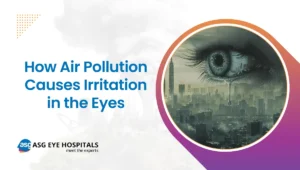Protecting your eyes from UV (ultraviolet) rays is crucial for maintaining good eye health and preventing conditions such as cataracts, macular degeneration, and eye surface disorders. UV rays, which are part of the sun’s electromagnetic spectrum, can cause both short-term and long-term damage to your eyes if not properly shielded against them. In this comprehensive guide, we will explore various methods and tips to help you protect your eyes from UV rays.
Understanding UV Rays:
UV rays are divided into three main categories: UVA, UVB, and UVC. UVA and UVB rays are the ones of primary concern when it comes to eye health.
- UVA (Ultraviolet-A) Rays: These rays can prematurely age your eyes, leading to wrinkles and other cosmetic issues. They can also contribute to the development of cataracts and other eye conditions.
- UVB (Ultraviolet-B) Rays: These rays are more energetic and can cause more immediate harm to your eyes. Prolonged exposure to UVB rays can result in eye surface disorders such as photokeratitis (similar to a sunburn of the cornea) and pterygium (an abnormal growth on the eye’s surface).
It’s important to note that UVC rays are generally absorbed by the Earth’s atmosphere and do not pose a significant threat to our eyes.
Tips to protect your eyes from UV rays:
1. Wear UV-Protective Sunglasses:
- Look for sunglasses labeled as providing 100% UVA and UVB protection. These sunglasses are designed to prevent UV rays from reaching your eyes.
- Choose wraparound or large-framed sunglasses that provide better coverage and protection for the sides of your eyes.
- Polarized sunglasses can reduce glare from reflective surfaces, making them an excellent choice for outdoor activities.
2. Use a wide-brimmed hat:
- A wide-brimmed hat can provide additional shade and protection for your eyes. It complements your sunglasses by reducing the amount of UV radiation that reaches your eyes from above or the sides.
3. Stay in the Shade:
- Whenever possible, seek shade, especially during peak sunlight hours (usually between 10 a.m. and 4 p.m.). Shade reduces direct exposure to UV rays and lowers your risk of eye damage.
4. Wear UV-Protective Contact Lenses or Eyeglasses:
- If you wear prescription eyeglasses or contact lenses, consider getting them with UV protection. Many optical lenses can be treated to block harmful UV rays.
5. Don’t Forget Your Kids:
- Children’s eyes are especially sensitive to UV radiation. Ensure they wear sunglasses with UV protection and wide-brimmed hats when outdoors.
6. UV-Blocking Goggles for Sports:
- If you’re involved in outdoor sports, consider wearing UV-blocking goggles designed for your specific activity. These goggles provide added protection and prevent debris from entering your eyes.
7. Regular Eye Exams:
- Schedule regular eye exams with an optometrist or ophthalmologist. They can detect any early signs of UV-related eye damage and provide guidance on how to protect your eyes effectively.
8. Avoid tanning beds:
- Tanning beds emit high levels of UV radiation, which can damage your skin and eyes. Avoid using tanning beds to protect your overall health, including your eye health.
9. Use UV-Blocking Eye Drops:
- Some over-the-counter eye drops contain UV-blocking agents. These drops can offer additional protection for your eyes when spending extended periods of time in bright sunlight.
10. Stay Hydrated:
- Adequate hydration can help maintain the health of your eyes. Proper moisture levels in your eyes reduce the risk of UV-induced dryness and irritation.
11. Educate Yourself:
- Stay informed about UV risks in your area by checking UV index forecasts. When the UV index is high, take extra precautions to protect your eyes.
12. Limit Screen Time:
- Prolonged exposure to digital screens can contribute to digital eye strain. While not a direct UV concern, it’s essential to give your eyes regular breaks from screens to maintain overall eye health.
13. Eat a Nutrient-Rich Diet:
- Consuming foods rich in antioxidants, like vitamin C and vitamin E, can help protect your eyes from UV damage. These nutrients can be found in fruits, vegetables, and nuts.
14. Stay Hydrated:
- Adequate hydration is essential for maintaining eye health. Proper moisture levels in your eyes reduce the risk of UV-induced dryness and irritation.
UV Protection Myths:
There are a few common misconceptions about UV protection that are worth addressing:
- Cloud Cover: UV rays can penetrate clouds, so even on a cloudy day, you can still be exposed to harmful UV radiation. Don’t assume you’re safe from UV rays when it’s overcast.
- Price Doesn’t Always Indicate Quality: While expensive sunglasses often come with better UV protection, it’s not always the case. Look for sunglasses with labels indicating 100% UVA and UVB protection rather than relying solely on price.
- Eye Color Matters: While individuals with lighter eye colors may be more sensitive to bright light, everyone’s eyes are susceptible to UV damage. Don’t assume that darker eyes are inherently more protected.
- Tanning Protects Your Eyes: Tanning does not provide any significant protection against UV radiation. In fact, it can increase your risk of UV-related eye damage.
Conclusion:
Protecting your eyes from UV rays is a crucial part of maintaining good eye health throughout your life. By following the tips outlined in this guide, such as wearing UV-protective sunglasses, using wide-brimmed hats, and staying informed about UV risks, you can significantly reduce your risk of UV-related eye damage and enjoy clear, healthy vision for years to come. Remember that prevention is key, so make UV protection a daily habit to safeguard your eyes from the harmful effects of UV radiation.

